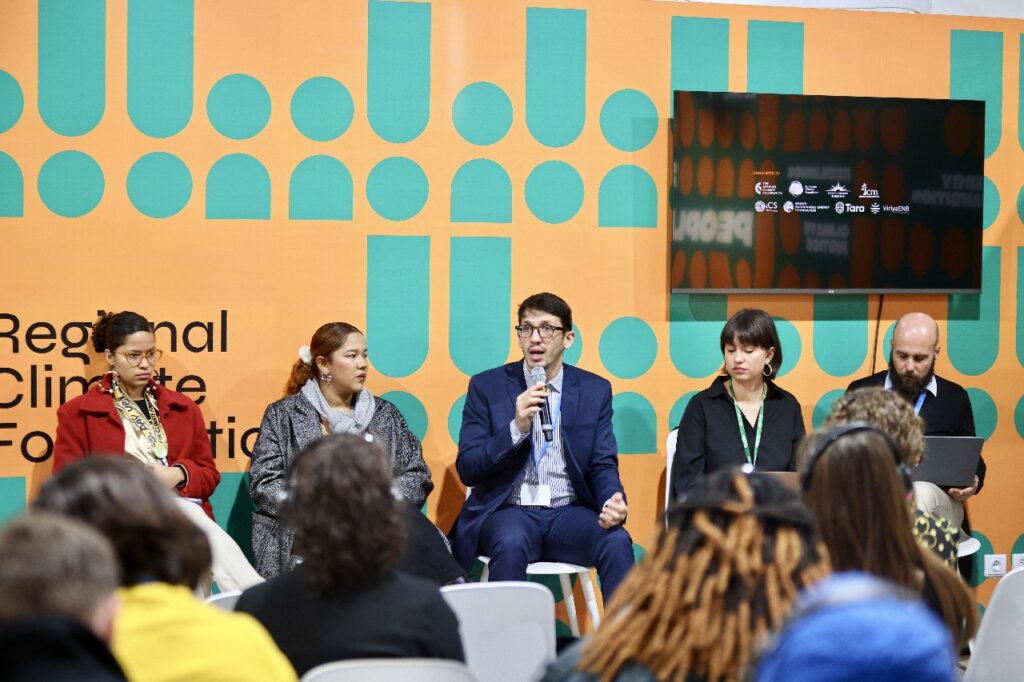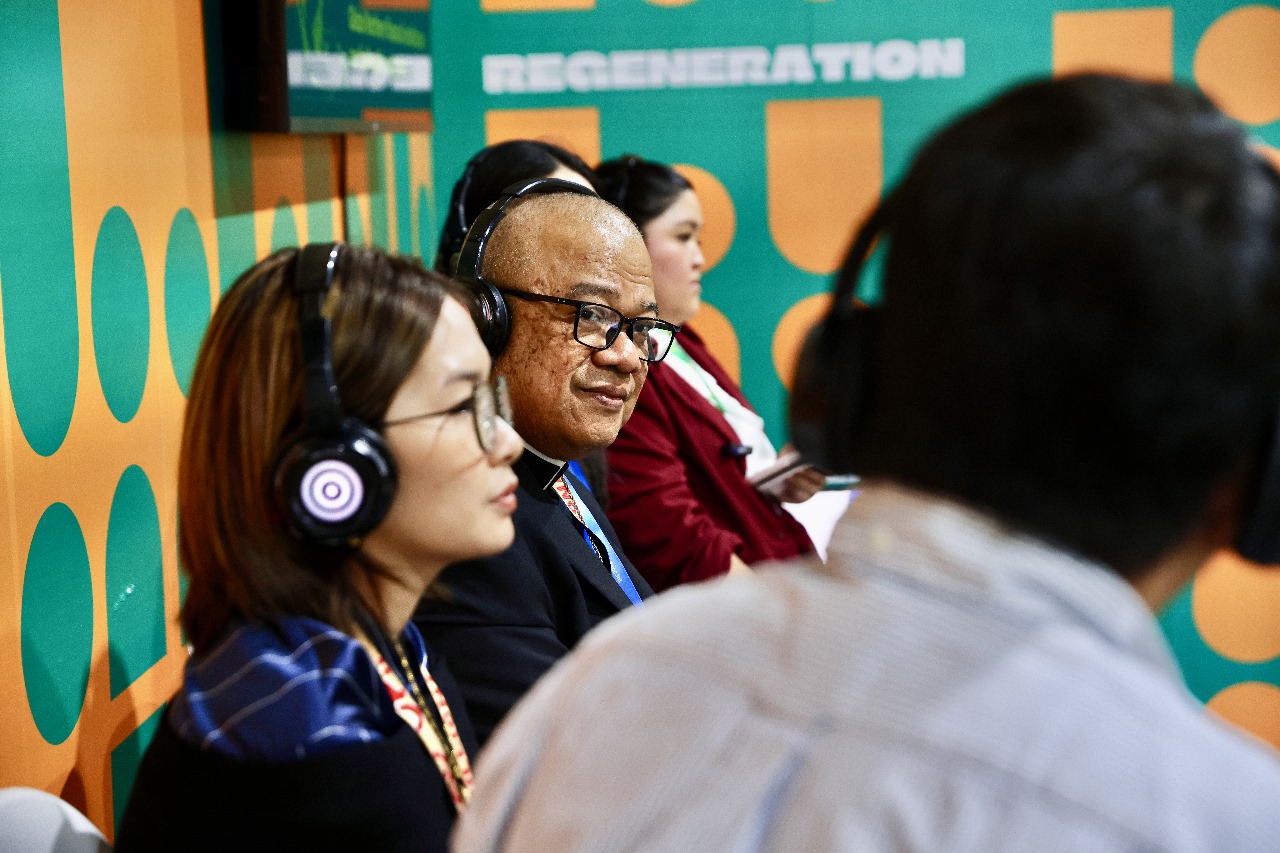The second week of debates in the Regional Climate Foundations Pavilion at COP29 in Baku, Azerbaijan, began with panels reverberating pleas for help. Unique ecosystems are dying due to climate change. And, with them, the traditional peoples who depend on these natural resources are also threatened.
That’s why activists called for the preservation of biodiversity hotspots — as the underwater ecosystem in the Southeast Asia. And also for income alternatives that would allow traditional people to sustain themselves without having to adhere to unsustainable economic activities. For example, agroecological supply chains in the Brazilian Amazon.
The first panel at this Monday (18) focused on the Southeast Asia ocean biodiversity and the people who rely on it. This region harbours the Coral TRiangle, a biodiversity hotspot, comprising 1,5% of the ocean’s surface, but where appear 76% of the coral riff and fishes species in the world. This richness ecosystem serves for many traditional communities as the main source of income and assures food safety in all the region: 26% of the world fisheries production comes from this part of the planet, and 39% of the local population protein consumption relies on the ocean (the global average is 19%).
But the economic expansion in this area — with a booming GDP growth — is leading to more demand for electricity and for new plants and projects on coal and gas. “Despite the mechanisms of the just transition, fossil fuel projects are increasing in the area”, said Gerry Arances, the executive director ate the Center for Energy, Ecology, and Development, that mapped the financial institutions that are leading the expansion.
Only in the Coral Triangle marine region, there are 100 blocks of natural gas active and other 450 being explored by potential extraction. “The existing and planned blocks comprise an area bigger than the land mass that forms the archipelago of Indonesia”, said Martha xxx. “If all this plants are developed, 15% of the Coral Triangle will be affected”, completed.
Over 100 million people depend economically on the area, but this expansion treats their activities. Some studies show the eater quality is decreasing due to toxic metal, and the warming of the oceans can kill the richest coral. “When we enter the COP29 space, we see that big sign at the entrance that says ‘it is time to act’, ‘let’s maintain the 1.5 goal alive’ and that no one life will leave behind”, remembered the bishop Gerry Alminaza, from Caritas Philippines. “But governments and financial institutions are doing the opposite. They are expanding fossil fuels”, completed.
Pakistan indigenous
In Pakistan, indigenous communities way of life is also being threatened by the coal production. But to assure the coal phase out combined with just transition in the region, experts gathered at a panel in the afternoon called for non-state actor action — reverberating the previous debate and highlighting the importance of the finance agreement to allow this process.

“In Pakistan, the north is well developed, but the south is still developing, with some parts that are not developed at all”, said Khalid Waleed, a research fellow at Sustainable Development Policy Institute.
These people, remembered Lidy Nacpil (photo), the coordinator of the Asian Peoples’ Movement on Debt and Development, are responsible for a very small part of the climate crisis, but are suffering it worst effects. “There will be no any global solution unless we take climate action locally, and this requires financing. The entire planet depend on the actions we will take in the global south”, concluded.
Family farmers will supply COP30 food services
In the Brazilian Amazon, indigenous, riverside people and quilombolas communities will be the main supplier of the COP30 food services — a way to assure their traditional way of life be preserved. “The Amazon biodiversity is a result of the way of living from people who wave being there for many centuries”, said Paulo Monteiro dos Reis, who is the president of the small farmers association in the Amazon which has 75 partners. “We have açaí, cocoa, casaba”, exemplified.
But 80% of the food consumed in Belém, the Brazilian city that will held the UN Climate Conference next year — came from other parts of Brazil. A coalition of social movements is working to assure the family farmers that lives in the Amazon supply the food at COP30. Their work was detailed in a debate this Monday (18) afternoon.
“Climate conferences are always about energy, fossil fuel phase out, transportation. The food systems are responsible for 30% of the greenhouse gas emissions, but they don’t receive the same attention as other sources of emissions”, completed Maurício Alcântara, from the Brazilian institute Regenera. In Brazil, deforestation is the main source of emissions — and it is connected with the food system based on commodities as soy and beef.

Lana Weidgenant, from ProVeg International explained that the movement is trying to achieve a more sustainable food services at COPs since many years. At COP23, they’ve implemented an action with the ‘sustainability task-force’ that exposed the carbon emisions of different types of foods. “In that moment, people started to thinking a while”.
At COP24, a step back: food service had intensive emission and that “called teh attention” on the participants. “Since COP26 the menu start to be more low emission, more plant based, last year particularly”, said.
“We already had the confirmation from the COP30 organizers that all the food will be sourced from local family farming. But we want to build pathways to include these foods in Belém supply chain beyond the COP”, explained Maurício Alcântara, from the Brazilian institute Regenera.
As well as guaranteeing a market for these farmers at major events such as the COP or at local fairs, we need to invest in ecological transition and the creation of local production chains. “We need to educate the population about how we are feeding ourselves and show the connection between this and the preservation of biodiversity”, concluded Anália Barreto, from Instituto Mapinguari.

